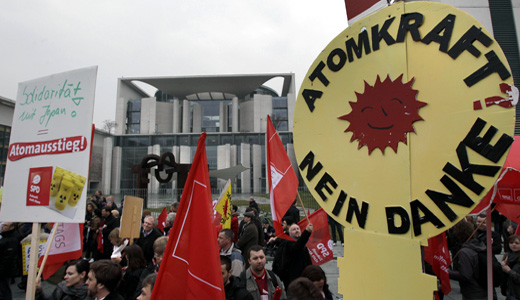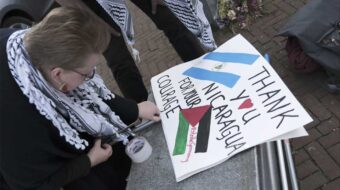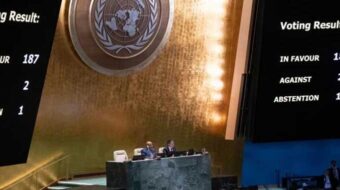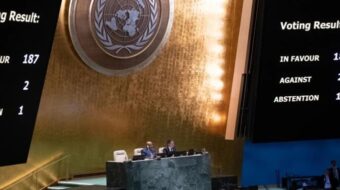
Germany: Japan disaster inflames anti-nuclear sentiment
In 2001, a Social Democratic-Green coalition government passed legislation to close all 17 German nuclear plants by 2021. As anti-nuclear demonstrations were breaking out in 250 German cities this year on March 14, Chancellor Angela Merkel reversed her center-right government’s five month old policy of extending the operation of those plants. She put that decision in abeyance for three months, the delay allowing for safety re-assessments. She also announced closure soon of the two oldest plants. Two days earlier, 60,000 protesters, reacting to events in Japan, had formed a 27 mile long human chain around one of them, near Stuttgart. Protests are expected, according to rebelion.org, at German nuclear power plants and nuclear waste sites on April 26 in memory of the 1986 Chernobyl catastrophe.
Niger: Election of first post-coup president
According to the election commission, Social Democratic Party candidate Mahamadou Issoufou, with 58 percent of the votes, defeated former premier Seini Oumarou in second round presidential voting on March 12. Turnout was 48%. The Army ousted President Mamadou Tandja in February, 2010, They and, remaining neutral during the elections, backing neither candidate. The military has pledged to turn over power in April. Tandja of the MNSD party, under whose banner Oumarou ran, had beaten Issoufou in two previous elections. Issoufou has promised to dissolve parliament and organize elections for an assembly with equitable representation. There is also pressure for redistributing wealth derived from the country’s large uranium deposits. Al-Qaeda remains active in the West African country, reports Agence France Presse.
Afghanistan: Karzai wants U.S. to end war
Visiting in Kunar Province on March 12, Afghanistan’s President Hamid Karzai paid homage to nine boys recently killed there by a U.S. air attack. They had been gathering wood. He took the occasion to ask NATO and the U.S. to end military operations in his country. Quoted by informationclearinghouse.info, Karzai said, “Afghans want peace and security and they cooperate with the world to bring peace and security. But we don’t want this war to continue any longer. We don’t want to repeat such bombardments and casualties.” A United Nations report released earlier in March indicated NATO air strikes killed at least 171 civilians in 2010. Two days earlier, a NATO night raid in Kandahar killed one of President Karzai’s cousins.
India: Weapons imports are up
A report released March 14 by the Stockholm International Peace Research Institute established India as the world’s top weapons importer, receiving nine percent of all imports during 2006-2010, ahead of second through fourth place importers China, South Korea, and Pakistan. Russia supplies 82 percent of India’s imported arms. India was also the world’s top arms importer during 1988-1992. The coutry fields 1.2 million soldiers, funded through a $ 20-25 billion defense budget. India’s weapons build-up is directed at alleged threats from Pakistan and China, reports Inter Press Service. The overall volume of arms transfers in the world for 2006 – 2010 was 24 percent higher than for the previous four-year period. http://books.sipri.org/product_info?c_product_id=421 The United States is still the world’s top arms exporter.
Ecuador: UNASUR gets to work
Foreign ministers of 12 countries gathering in Quito on March 11 activated the Founding Treaty of the Union of South American Nations (UNASUR), signed in 2008. The requirement for nine countries approving was reached a month ago when the Uruguayan parliament signed on. The UNASUR ministers chose former Colombian and Venezuelan foreign ministry officials to serve as the organization’s secretary general: María Emma Mejía of Colombia and Venezuela’s Ali Rodriguez would be dividing a two year term. Apparently the ministers were acting, in pragmatic fashion, to downplay recent confrontations, especially those between Colombia and Venezuela. UNASUR work aimed at regional integration can now begin, reported MercoPress, citing in particular the Bank of the South.
Cuba: U.S. blockade includes health funds
The United Nations Development Program recently informed Cuba that the U.S. government, in unprecedented fashion, has frozen this year’s first trimester, $4.2 million dollar allocation of funds that the Global Fund to Fight AIDS, Tuberculosis and Malaria provides for Cuba. Cuba would have added the money to $200 million its health system annually dedicates to preventing HIV/AIDS infection and treating affected people. These efforts, maintained throughout the almost thirty years of the pandemic, have earned worldwide recognition. On March 12, foreign trade official Orlando Hernández, quoted by Cubadebate.cu, pointed out that “this action is added to a long list of examples of extraterritorial application of economic, commercial, and financial encirclement of Cuba by the United States for more than 50 years.”
Photo: Protesters against nuclear energy demonstrate in front of the chancellery in Berlin, Germany, March 14. Slogan on the right poster reads “Nuclear Energy? No Thanks”. Slogan on the left poster reads “Solidarity with Japan!” Ongoing anti-nuclear protests come ahead of three German state elections in the next two weeks. (Michael Sohn / AP)












Comments